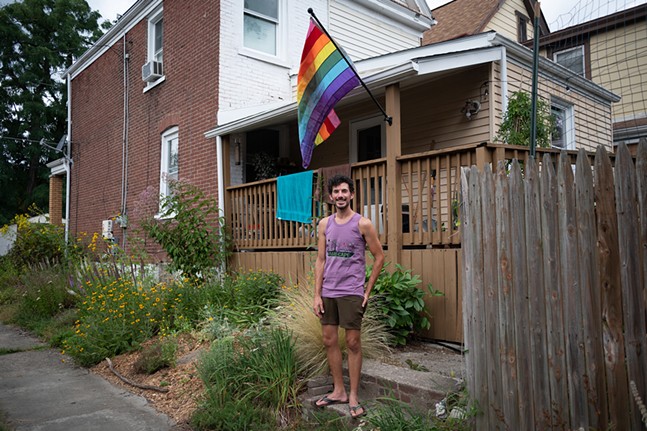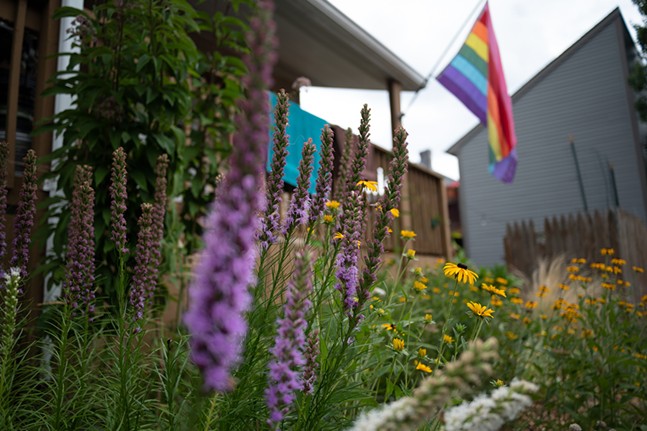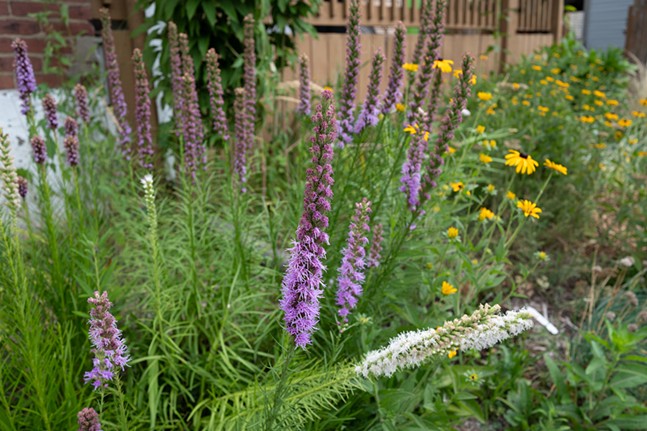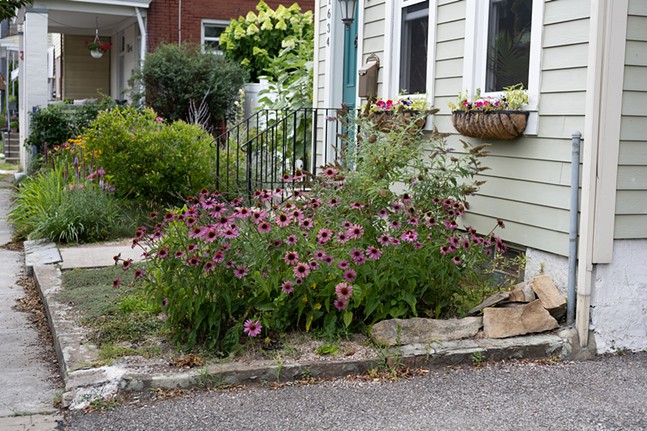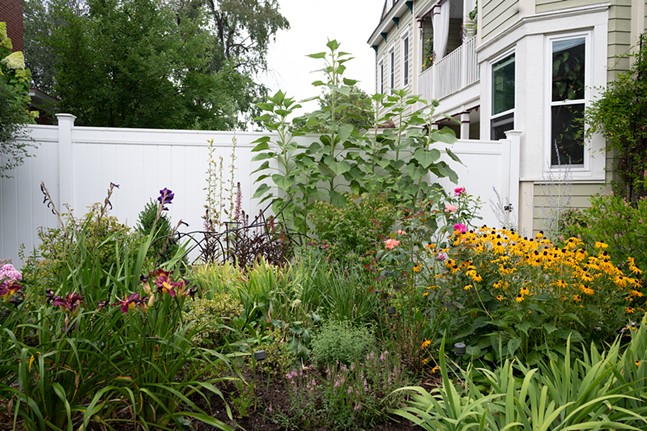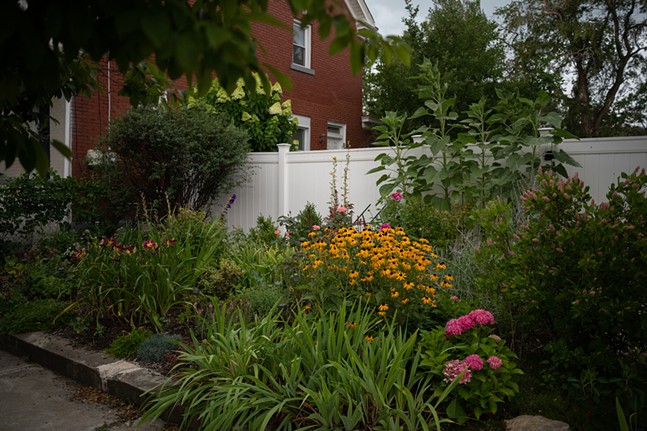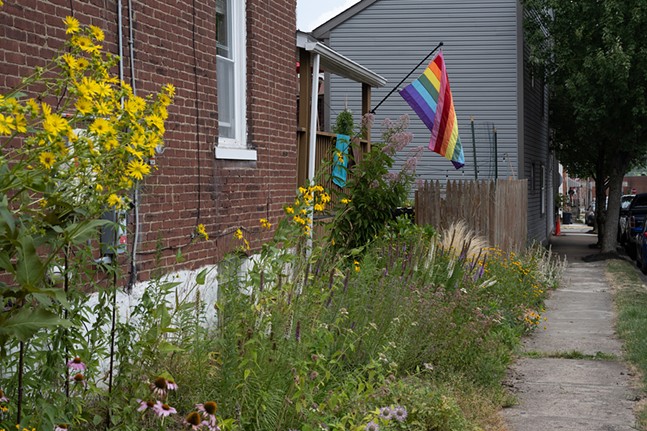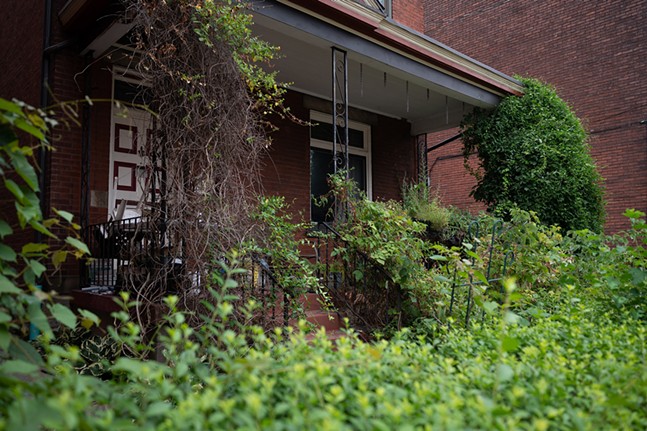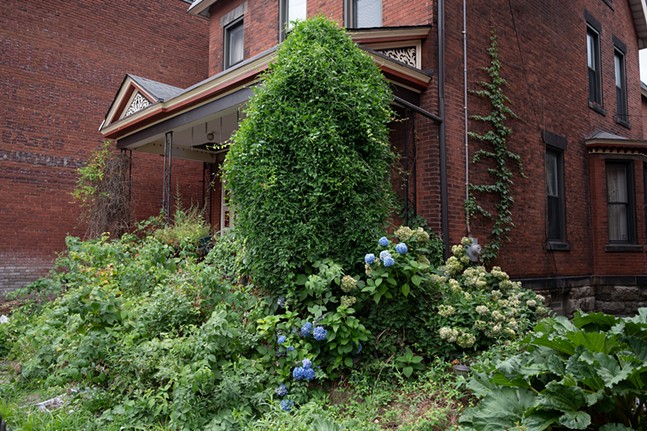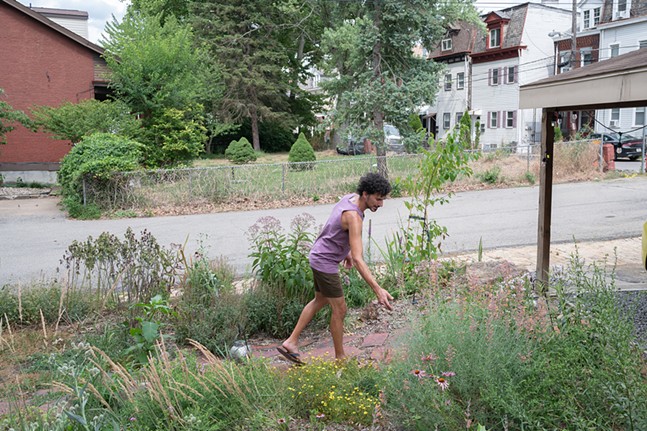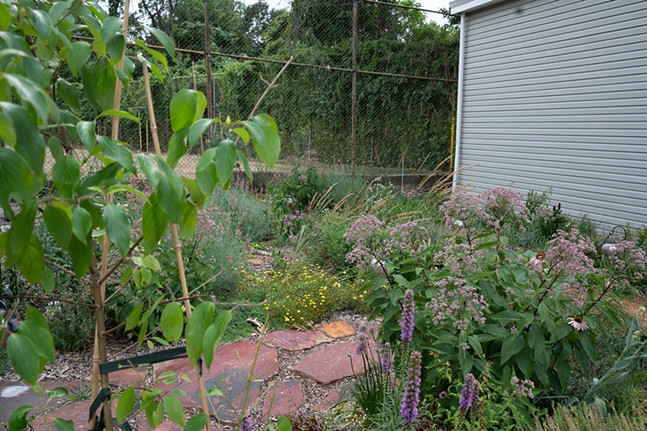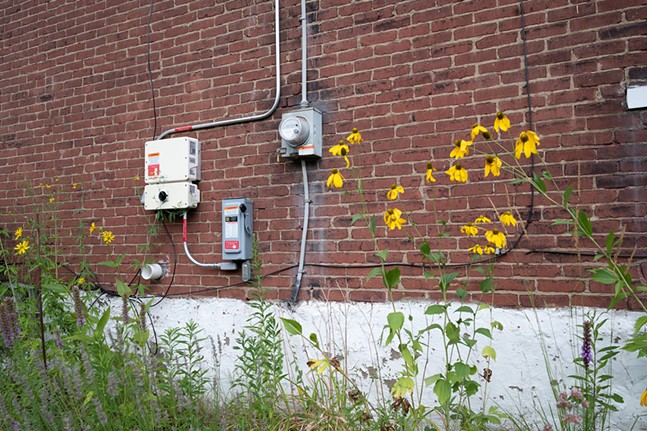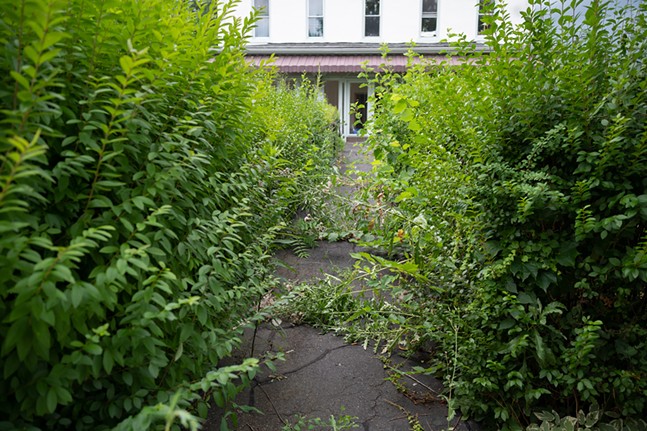In D.S. Vale’s Troy Hill garden, each plant — ideally — does something for pollinating bees or migrating birds; old soil or new fungi; passing commuters or stuck-in neighbors. Part of an expanding number of gardeners who are interested in sustainability, ecology, and native plants, Vale talks about gardening in terms of living alongside, rather than having control over, other living things.
Despite these good intentions, Vale received a letter from the City of Pittsburgh in 2021 informing him that his gardens violated city property maintenance code 302.4, which states:
“Premises and exterior property shall be maintained free from weeds or plant growth in excess of ten inches. Noxious weeds shall be prohibited."
The code goes on to exempt cultivated plants and stipulate that, should an owner fail to abide by this code, the city has the right to mow the owner's lawn and stick them with the bill. Vale’s plants were placed intentionally — were cultivated — but the neighbor who called 311 didn’t know that. Neither did the code enforcement officer who visited several times. Despite seeming like a minor bit of legal structure, codes like these are causing friction in an era of changing ideas about the grass-centric American lawn and the purely ornamental garden.
Code 302.4 is a product of the International Code Council, a private organization that develops and publishes model building, electrical, plumbing, and property maintenance codes. State and local governments adopt ICC codes as readymade standards for keeping residential and commercial environments safe. Pittsburgh adopted the ICC’s International Property Management Code, with revisions, in 2004. ICC codes, which the organization says impact nearly 2 billion people, are developed by committees, then voted on by a general membership that includes local officials, industry representatives, and consumer advocates.
While high-profile code changes get national news coverage, other codes quietly go unrevised for years, if not decades. The ICC hasn't significantly updated IPMC code 302.4 on weeds in the past 20 years. In 2003, the ICC made a minor change, making the maximum grass height a variable value set by city officials, rather than a default of 10 inches. The present code does not directly exempt tall native plants, especially “volunteers” (e.g. not planted intentionally by the resident), from the height restriction. When asked to provide background on code 302.4 for this article, Beth Tubbs, vice president of codes for ICC, provided a distorted screenshot summarizing the development of the IPMC as a whole. Tubbs' response fits Vale's experience of receiving a citation from the city.
"The letter didn't tell me which plants were a problem, or how to correct things. The lack of clarity around specific problems was surprising to me," Vale recalls.
Although the City of Pittsburgh Department of Permits, Licenses, and Inspections suggests that most tall grass/weeds violations are related to abandoned property, stories like Vale’s complicate this picture. Beyond property abandonment, there are several reasons why a yard or garden might violate code 302.4. In 2023, Angela Staeryla of Mt. Washington received several citations from the city for overgrown plants in her alleyway. Staeryla, whose disability prevents her from weeding the property herself, had relied on the City Cuts program to keep things up to code. In an interview with WPXI, Staeryla reported that City Cuts did not visit her property in 2023, leading to the overgrowth for which she was cited. As a result, Staeryla was facing fines and legal fees of up to $1,000 per day.
Ashley Mielcarek also received a citation last year after a neighbor filed a 311 complaint about Mielcarek’s Pittsburgh garden — which is certified by the Audubon Society as a wildlife habitat. The complaint devastated Mielcarek who felt she was being asked to give up her passion.
“We bought the house with the express intention to build a permaculture food forest in an urban setting,” Mielcarek says.” We've fed ourselves delicious nutrient-rich food, and we've become more connected with the environment and our community through this practice.”
In an ideal world, projects like the International Property Maintenance Code ensure a certain amount of safety across residential and commercial properties. In reality, however, they may be like America’s ubiquitous grass lawns: a universal ideal that we’d be better off replacing with local solutions.
The lawn, that green safety blanket of suburban comforts, is described by entomologist Douglas Tallamy as an "ecological dead space," a monoculture that contributes to habitat loss, stormwater runoff, and over-application of pesticides. Molly Glick at Sierra magazine writes that the American lawn originated with wealthy colonial settlers who planted expensive turf grasses to recreate idealized English grounds. These early lawns were often managed by enslaved Africans, linking the lawn’s uniformity to the brutal violence of the transatlantic slave trade. Post-Emancipation, the lawn has persisted as a symbol of personal financial success and domination over nature.
For several decades, environmental advocates have proposed alternatives to the lawn, including urban farming, pollinator gardening, and "rewilding," the practice of populating cultivated land with native species found in neighboring wild patches. These approaches often have aesthetic results that can be mistaken for overgrowth or neglect — like dead plant stems (ideal insect lodging), fallen leaves (natural weed suppressant), and dried wildflower seedheads (critical winter food supply for wildlife). As of June 18, 2024, the City of Pittsburgh’s revised version of code 302.4 also mandates the removal of these types of plant-related debris.
In America, any discussion of aesthetics often transitions to a conversation about property value. In 2014, real estate agent Alex Gul asked the Indiana Court of Appeals to recognize his unmowed lawn as a protected expression, though neighbors worried the tall, native plants might tank resale values. Gul, who had been fined repeatedly for tall grasses by the City of Bloomington, argued that, "modern day lawns have no reason to exist besides their perceived 'beauty,' the price of which is a tremendous burden on the environment and our society." Gul saw his lawn as a statement of ecological conscience. The City of Bloomington and, eventually, Indiana Court of Appeals sided with the neighbors, and Gul was required to trim his lawn. He did so using scissors and a ruler.
Jacqui Pierce found herself in a similar position when, in the summer of 2023, the city of Somersworth, N. H. notified her that her lawn was out of compliance with local code. After seeing bees frequenting wildflowers among the grass, Pierce left an unmowed patch in support of the pollinators. Although Pierce didn’t pursue matters into the courts, and eventually trimmed her lawn once the flowers died back, news of her citation sparked discussion of revising Somerworth’s property codes.
For Jeff and Janet Crouch of Columbia, Md., the road to change was much longer — and much more expensive. Over several years, the Crouches turned their property into an eco-friendly landscape that supported native flora and fauna. Then, a neighbor complained to the local homeowner’s association that the Crouches’ gardens were out of compliance with code. The couple refused to mow down their garden, and spent over $60,000 across three years, to fight the HOA in court. In the end, their case resulted in Maryland House Bill 322, which prevents HOAs from disallowing "low-impact landscaping" outside of common spaces. In Maine, state statute 1424 offers condominium owners similar protections. Some municipalities, like Royal Oak, Mich. and Brookfield, Ill. have revised their local property codes to specifically protect native plant gardens.
Property values, often used to argue for a “manicured” lawn, increase or decrease depending on current opinions and knowledge. Opinions and knowledge might shift as a result of conversation. That’s the hope of Chris Kosin of GaiaScape LLC, a Pittsburgh landscaping company "focusing on native and edible landscapes." Kosin says he's often approached on-the-job by curious passersby.
"In one case, someone came by to ask why I was removing her favorite lawn in the neighborhood," Kosin recalls.
In these moments, Kosin takes the opportunity to explain why his client might want something other than a photosynthetic carpet. Kosin's most successful talking point is a truth many Americans are afraid to admit: lawn care can be miserable. Paul Robbins, in an interview for The New Republic puts it bluntly: "People don’t like lawns. That’s the irony; more and more people don’t want them, but nothing has changed." Lawns require constant labor and can be pricey to keep verdant. So, who wants all these lawns kept in place? According to Robbins, it’s the corporations marketing fertilizers, pesticides, and lawn care gizmos who are invested in maintaining the status quo.
By contrast, Kosin says he hopes clients won't have to call him for ongoing maintenance. His goal is to install landscaping that, with some thoughtful tending by the owner, sustains itself.
Jess Runco, who operates Touch of Green Landscaping in Pittsburgh’s East End, suggests that garden signs — identifying native plant gardens or certified pollinator gardens — can go a long way in educating neighbors. Design is key, too.
"I think being mindful about your garden design is smart. Using some flowers in your design will sway people into seeing your space as a garden," rather than as a blighted property, Runco says. Still, plants like goldenrod and asters may be mistaken for weeds by Zillow-tracking neighbors.
Runco and Kosin both point out that garden design isn't just about what you plant, but also where.
"Having spacial awareness around your plantings is important,” Runco explains. “You don’t want to plant something tall or shrubby in a hellstrip [the strip of grass between the street and sidewalk] or on a corner where it could be a visual obstacle for people or cars.”
Kosin adds that mindful design choices ensure sidewalks are clear for wheelchair users and mail carriers. That thoughtfulness points to what city property codes might do: avoid placing unfair burdens on others, especially those who might already have limited access to space and resources.
Although the city’s code violation letters can be menacing, with threats of compounding fines and legal fees, Ashley Mielcarek says enforcement officials were amenable to her permaculture goals.
“The city dropped the complaint pretty quickly,” she says. “I sent one email explaining that we intentionally plant native species that serve a specific purpose, no matter how weedy they look, and the investigator seemed pretty happy to let it go.”
The unnamed party in most of these stories is the complainant — the person who calls 311. Code 302.4 is built for an old city of property values protected through anonymous complaints, identically-gardened plots, and one-size-fits-all norms. That’s not the city many of today’s Pittsburghers want, especially in their own gardens. Dan Brown, constituent relations director for the City’s 5TH District, suggests even some city leaders are ready for changes.
“We're certainly sympathetic to anything that might mitigate stormwater runoff, improve habitat connectivity, and greenify Pittsburgh,” he says.
Vale’s neighbor probably called 311 to get their way but, if anything, the call clarified to Vale the principles he’s trying to grow.
“My garden is a reflection of my interests, not an external sign of success. Part of growing something other than a lawn is showing others what else is possible.”

